Mount Holyoke alumnae make a run for political office
Since Hillary Clinton’s defeat in the 2016 presidential election, record numbers of women have declared their candidacy for elected office. This season, Mount Holyoke alumnae are both on the ballot and behind the scenes.
Emily Martz ’94 left her job as deputy director at the Adirondack North Country Association to run for U.S. Congress in her conservative upstate New York district. The decision came, in part, out of a conviction that Democrats weren’t successfully communicating that they represent white, working-class people. “In my area in particular, which is 97 percent white and low-income, Democrats as a party did not articulate that they stand for their own constituents,” says Martz.
It also grieved her to see political discourse in America become so polarized. “One of the big reasons that we had the results we did in 2016 is because we just weren’t talking to each other,” says Martz, who majored in history and minored in politics at Mount Holyoke. She began having as many conversations as she could with people who had different political backgrounds than her own. By May, she had decided to run for the U.S. House seat in her district: New York’s 21st.
Making Herstory
Martz was one of a record-busting 467 women running for seats in the U.S. House this year,* according to the Center for American Women and Politics at Rutgers University’s Eagleton Institute of Politics. (The previous record had been 298, set during the 2012 election cycle.) Record numbers of women are running for other political offices as well: In mid-May, for example, 47 women were running for governor, including Stacey Abrams, who on May 22 won Georgia’s primary and could become the nation’s first black female governor if she wins in November. There’s also been a surge of women running at the local level, for state Senate and House, city council and school board. Most of these female candidates are left-leaning: 352 of those 467 women who ran for Congress are Democrats. And all of the alumnae we were able to identify for this article share this party affiliation. The 2016 presidential election of Donald Trump — a candidate with no political experience — over Hillary Clinton, who had many years of experience, including eight years as senator from New York, has for some been a motivating force.
Mount Holyoke women have long pursued careers in public service — some as elected politicians and others in appointed positions. The first to come to the minds of many alumnae is, of course, Frances Perkins, class of 1902, who was appointed secretary of labor by President Franklin Delano Roosevelt in 1933. But Mount Holyoke has also produced a host of other well-known alumnae who have held political office, including Ella Tambussi Grasso ’40, who in 1974 was elected Connecticut’s first female governor, New York congresswoman Nita Melnikoff Lowey ’59, who is currently serving her 15th term, and Elaine Chao ’75, current U.S. secretary of transportation and secretary of labor under President George W. Bush. To identify alumnae who may join the ranks of these whose stories and legacies we already know, we engaged with clubs and Facebook groups, put out a greater call on social media, and searched the Alumnae Association’s directory. We found several women who are running for office — some for the first time — and others with careers in the political arena.
* Shortly before we sent this issue of the Alumnae Quarterly to the printer, we learned that Martz did not win the primary. She soon declared her intention to run as the Democratic candidate for New York State Senate in the 45th district. Martz and a group of volunteers worked to gather the needed support, collecting 1,998 signatures — nearly double the 1,000 required — in just nine days. She is running against an eight-term Republican senator who has not had a Democratic challenger since 2006.
Wake-Up Call
The first time Eileen Hartnett Albillar ’96 ran for elected office was last year, when she threw her hat into the ring for township supervisor in Warrington, Pennsylvania. She won. “After the presidential election, I was incredibly motivated,” says Albillar, who is a social worker and the mother of two young children. “So many things aligned. It was time for women to step up!” In her job at Bucks County Opportunity Council, Albillar works on anti-poverty and homelessness issues, as well as public transportation options. “When I thought about my community and how I could better advocate for those in need, I wanted to get involved at the municipal level.” Since township supervisor is a volunteer position in Pennsylvania, Albillar continues to work 30 to 35 hours per week as a social worker.
Albillar’s classmate Tami Gouveia ’96 has known since she was at Mount Holyoke that she would one day run for office, but it wasn’t until she founded and co-led the Massachusetts chapter of the Women’s March in the fall of 2016 that she took the plunge. A progressive Democrat, she is now running for state representative in Massachusetts’ 14th Middlesex district, a liberal, predominantly white enclave northwest of Boston that includes the towns of Acton, Carlisle, Chelmsford and Concord.
Seeing our ability to organize something on such a large scale in a three-month period built up my confidence and my network.Tami Gouveia ’96, referring to the Women’s March
But her decision to run also came out of her vision for where this country should be going. “We have extreme income inequality, extreme health disparities — whether it’s based on gender, immigration status, race or ethnicity,” she says. “I was fearful that Trump’s administration would make things worse, and I think that is proving to be true.”
At Mount Holyoke, Gouveia majored in politics, taking classes with Preston Smith, Joan Cocks and Douglas Amy. In Electoral Politics, Amy covered ranked-choice voting, an issue that has come to the fore in the U.S., particularly in Maine and Massachusetts. “I learned about this in the classroom 25 years ago!” Gouveia says. In the fall of her junior year, she volunteered for Ted Kennedy’s successful re-election campaign for U.S. Senate against Mitt Romney. A single mom of two teenage boys who still has a full-time job as project director at The Rippel Foundation (a health care innovation firm), Gouveia says this state representative race is nonetheless the right race at the right time. She is running for the seat vacated by another woman, Democratic State Representative Cory Atkins, who is retiring after serving for almost 20 years. Gouveia is up against three male candidates in the primary in September — two are Democrats and one is Green-Rainbow Party. If she wins, she will not face a Republican candidate in the general election.
Training Camp
As recently as five years ago a research study by Jennifer Lawless at American University and Richard Fox at Loyola Marymount University concluded that women are less likely than men to think they’re qualified to run for office, and, at the same time, men are 15 percent more likely than women to be recruited to run.
“It’s a fairly intelligent decision to think that the idea of running for office is not smart,” says Karen Middleton ’88. “You don’t feel you have privacy, you are attacked.” Case in point: When she was a Colorado state representative from 2008 to 2010, Middleton received Facebook messages from strangers criticizing her attire and makeup. After leaving the Colorado legislature in 2010, Middleton spent three years as president of Emerge America, which recruits and trains Democratic women candidates in 25 states. Her job, in other words, was to convince women to run for office — regardless of such drawbacks.
We’re needed. And time and time again, when women are leading, the conversation, the office, the policy are all changed. The pros outweigh the negatives once you are in.Karen Middleton ’88
“Women used to say ‘I’m not qualified to run for office! I’ve never done this,’” echoes Mary Jane Trapp ’78, who has already served one six-year term as a judge on the 11th District Court of Appeals in Ohio and is now running for another. Trapp helped organize political trainings for female candidates sponsored by the Ohio Democratic Women’s Caucus. These trainings, which teach candidates communications and messaging, how to build a volunteer team and fundraising basics, are crucial to helping women overcome their insecurities about running for office. “After a weekend of training a woman who you literally had to beg to run, she’ll say, ‘Now I have the tools to do this.’”
In recent years, many political organizations and political action committees have sprung up to help recruit, endorse and elect female candidates. There are nonpartisan organizations like Ready to Run and She Should Run. On the left, the two best known are Emerge America and EMILY’s List; on the right, there areMaggie’s List and the National Federation of Republican Women. There are many other regional organizations like Eleanor’s Legacy in New York, Annie’s List in Texas and Sally’s List in Oklahoma.
When Middleton, now the executive director of NARAL Pro-Choice Colorado, was president of Emerge, she worked with the state Emerge programs and attended many of their trainings. One is a six-month training (held on weekends) and the other a weekend boot camp. The boot camps are meant for women who are running this election cycle. The more in-depth program helps potential candidates build their skills — and their networks.
Karin Power ’05, a Democratic state representative in Oregon, took Emerge Oregon’s longer training back in 2015, after she had been elected to city council in the Portland suburb of Milwaukie. “It was fantastic — a chance to hang out with other women who care deeply about the direction of civics and politics,” she says. The Emerge training helped her determine what type of political office she might want to run for some day and which major players and stakeholders she’d need to seek endorsements from.
When this House of Representatives position opened up, I did not panic. I went to get my Emerge Oregon handbook off of my bookshelf and started doing the work.Karin Power ’05
Albillar says she never would have run for township supervisor in Pennsylvania if it weren’t for the training she took with Emerge — even though it was a decade ago. “I had no interest in politics at all until someone [from Emerge Arizona] literally came up to me and said, ‘Did you ever consider running for office?’” The training planted a seed, she says. In the intervening years, she has been honing the skills she learned. “In Emerge you learn about fundraising, public speaking, how to get your message out, networking, all of that,” Albillar says. “Whenever I had an occasion to do a TV spot for work, I thought ‘This will be good practice.’ So I’ve been fine-tuning these skills to help me gain confidence over time.”
Gouveia, who is running for the Massachusetts House seat, also graduated from Emerge training a decade ago, and she’s still in touch with the other women who completed the program. “We’re sharing information, we’re sharing strategies. We’re using each other as a sounding board for things we’re experiencing.”
Fundraising Smarts
“Fundraising is not natural to most people,” says Ann O’Leary ’93, who was Hillary Clinton’s senior policy advisor for many years and now practices law at Boies Schiller Flexner LLP in Oakland. “But it’s so important to learn to fundraise.” Fundraising is critical because it buys visibility: television spots, direct mailings and lawn signs. Most candidates hire a paid campaign manager, as well. Emerge and EMILY’s List trainings both cover fundraising basics.
But one doesn’t always need to follow received political wisdom to the letter. When Martz was exploring running for Congress, she was told that she shouldn’t run unless she could raise $100,000 from her immediate circle of friends and family. “Well guess what? I cannot come up with $100,000,” Martz says. “I thought to myself, ‘That is not the reason not to do it. If that’s the bar, then we’re excluding very good people from running.’” Through EMILY’s List she met a woman who wanted to be part of a grassroots campaign, and together they figured out how to raise money without needing to rely on the pockets (deep or otherwise) of family or friends. In addition to throwing house parties, making phone calls and using social media, they reached out to board members of social service organizations and economic development nonprofits that share Martz’s values. The Mount Holyoke alumnae network was incredibly supportive, too, says Martz. And each quarter, Martz and her campaign volunteers managed to raise more than the quarter before. By May, despite an average contribution of $120, they had raised more than $215,000.
Oregon Representative Power says fundraising is easier if you stay focused on the issues. “Try to think of your campaign in the third person when you’re approaching fundraising, and then it becomes less about you and more about what you stand for. For example: ‘Why would I care about electing Karin Power to office?’ Because she reflects my values and will fight for the things I care about. By investing in her, they’ll be investing in a healthier and safer environment, in better schools, in more transparent and accountable government and in the next generation of women who are stepping up to lead.” This approach shifts the focus from a personal ask to fundraising for outcomes we all want to see in our communities.
And if you’re not running for office but want to pour your energy into getting a woman elected, O’Leary has a tip.
The hardest time women and people of color have is in the primaries. Help those people get to victories in the primaries, and then they can tap into a larger Democratic fundraising circle. Ann O’Leary ’93
Balancing Act
One of the reasons women don’t run for office as much as their male counterparts is because — even in 2018 — they continue to be primary caregivers for their children. But women aren’t letting this stop them anymore. Last April, the U.S. Senate became slightly more family friendly when senators unanimously passed a resolution allowing any senator to bring a baby onto the floor during a vote. Illinois Senator Tammy Duckworth, for whom the rule was ostensibly passed, took advantage of this new rule a day later, bringing her 10-day-old infant onto the Senate floor so she could vote.
This determination is shared by many MHC alumnae politicians, many of whom are mothers. “Family is a part of our lives. I don’t make an apology,” says Albillar, whose husband, Josh, is a police officer. “I want to change the culture so it’s more acceptable to bring your children and families. Community is every age.” Albillar also realizes the power of modeling for her children that women do have a place at the table in government. She tells the story of when her 5½-year-old daughter went with her to a fundraiser for a local state candidate. The candidate was giving her stump speech and started talking about “The Little Engine that Could.” Albillar’s daughter tugged on her arm and asked, “Mommy can I ask a question?” Albillar told her to wait until after the speech, but the candidate had heard her and said, “Do you have a question?” Albillar recalls. “And my daughter said, ‘I like how you brought up “The Little Engine that Could.” He tried and he tried until he made it!’ And it was such a proud moment for me. My daughter had a voice — she wasn’t afraid.”
Gouveia’s sons, ages 13 and 16, have been supportive of her decision to run. Not only do they cook dinner and take care of the family pets, her older son has gone canvassing with her, takes photos on the campaign trail and has encouraged other youth to volunteer for his mom’s campaign. “And my younger son said, ‘You should do it, you would be really good at it! You will help a lot of people,’” says Gouveia.
Power, the Oregon representative, says a lot of people ask her how she balances work and family life. “And frankly, you don’t,” she says. “But if we don’t have younger working women engaged in politics, you miss that five- to 10-year learning curve. My wife and I were personally committed to making it work so that I didn’t have to wait. And it’s hard, but I’m amazed by how many other women are out there who are supportive.” Power brings her two-year-old son with her everywhere, including the State Capitol. Her leadership has been very supportive of her need to leave early one day a week, to pick him up at daycare.
Rallying Cry
When Lisa Kaprielian Kouchakdjian graduated from Mount Holyoke in 1992 with a degree in politics, Colorado Congresswoman Patricia Schroeder gave a rousing Commencement speech in Gettell Amphitheater. When Schroeder graduated from law school in 1964, she said, there were 24 women in the House of Representatives and just one woman in the Senate. “Today [i.e., 1992] there are 29 women in the House and there are two in the Senate. That is not very much progress, not at all,” she said. “I think we have a tremendous public service crisis in this country. … Let me tell you, you cannot build a government that is better than the people running it. So if you don’t like the people running it, for crying out loud, get out and run it yourself! The time has come!” Kouchakdjian never forgot Schroeder’s words. “That speech has stayed with me my whole life,” she says. After Mount Holyoke, she went on to get her law degree and became a litigation attorney. But a few years ago, she ran for Sudbury Public School Committee in Massachusetts and won. In March 2018, she won a second term. “I love it. I love using my advocacy skills to support students and teachers,” she says. She’s committed to her community and to her role on the school board. “We have a lot of work to do.”
O’Leary agrees. Though she was uniquely devastated when Hillary Clinton lost in 2016 — she had spent three months before the election preparing for the transition to the White House — she is buoyed by the surge of women around the country who are running for office now. “One of the things I’ve always said to the young people who work for me is that one of the biggest lessons you learn is, ‘I’m the adult in the room. If I don’t step up, no one will step up.’” That can mean stepping up for elected office or being a leader in your organization or in your community. “It’s incredibly inspiring to see women stepping up for office, and I hope they keep stepping up. We have to lead.”
—By Hannah Wallace ’95
Hannah Wallace ’95 lives in Portland, Oregon, and writes for Civil Eats Inc., Food + Wine and Vogue.
—Portraits By Alison Kolesar
This article appeared as “She’s Running” in the summer 2018 issue of the Alumnae Quarterly.
August 2, 2018


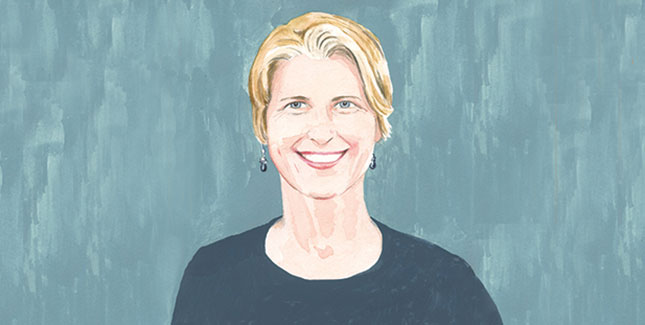
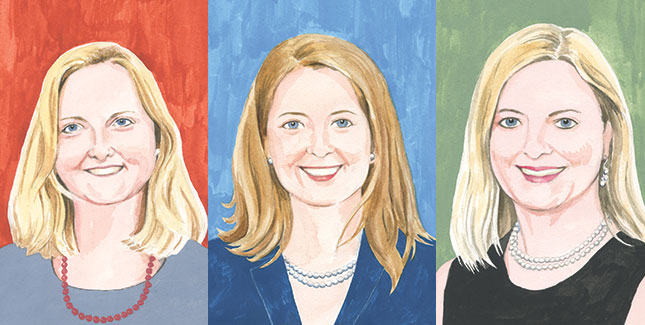






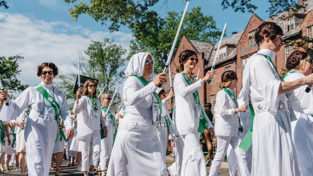
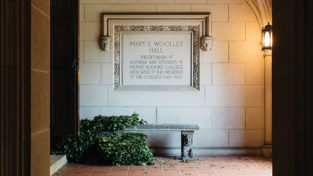
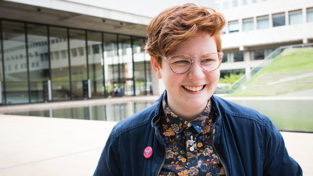
Great idea, Sally! I’m in.
I supported Emily Martz. If we were better organized there is so much more we can do to bring Mount Holyoke women with an amazing education and a strong sense of self to our state legislators, city and town councils and to Congress. Voices needed at every level. Onward.
Excellent article. How about a PAC to support MHC alumnae running for office? I’ll contribute seed money.
Sally Donner ’63
I believe you were my “baby sister” at MHC. I enjoyed a delicious dinner at your house in South Hadley –meat loaf and baked butternut squash, still favorites with my family.
After working on JFK’s campaign in Springfield, and serving in the Peace Corps (Northern Nigeria after graduation, I’ve been been active in grassroots politics here in Kent, CT.
I would gladly endorse your idea of a PAC to support MHC alumnae running for office.